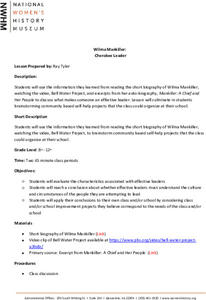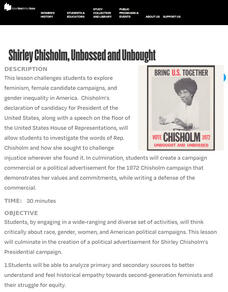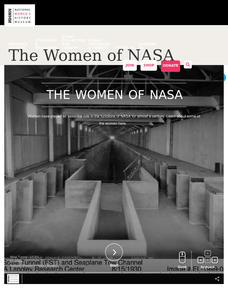National Woman's History Museum
Stacey Abrams: Changing the Trajectory of Protecting People’s Voices and Votes
In this project-based learning lesson, young social scientists investigate Stacey Abrams' campaign to protect the voting rights of people across the nation. Investigators learn how to annotate assigned articles, watch videos, and collect...
National Woman's History Museum
Dolores Huerta: The Life and Work of a 20th Century Activist
Extra! Extra! High schoolers read about Dolores Huerta, the social activist who helped organize the United Farm Workers. Researchers read primary and secondary sources about Huerta's work and craft a headline, supported by three pieces...
National Woman's History Museum
Gloria Steinem, Feminism and “Living the Revolution"
Excerpts from Feminine Mystique by Betty Friedan and from Gloria Steinem's "Living the Revolution" provide high schoolers an opportunity to study the feminism of the 1950s and 1960s, sometimes called the "Second Wave of Feminism."
National Woman's History Museum
Dolores Huerta and the Delano Grape Strike
Few have heard of Dolores Huerta and her part in organizing the California farm workers, establishing the United Farm Workers union and orchestrating the Delano Grape strike. High schoolers consider why this powerful woman has been...
National Woman's History Museum
Women, Education, Sports, and Title IX
Title IX did more than change the face of sports in the United States. This landmark legislation also impacted women in education and politics. High schoolers examine the text of the legislation and the 2016 Senate resolution and watch...
National Woman's History Museum
Wilma Mankiller: Cherokee Leader
Middle and high schoolers consider the characteristics that make for a great leader. For example, they investigate Wilma Mankiller, the first female Principal Chief of the Cherokee Nation. Researchers read a short biography, watch a...
National Woman's History Museum
How Do We Remember and Honor the Contributions of Women in Public Space?
Public art, especially monuments and memorials, are designed to celebrate and honor those who have made significant contributions to a community or even an entire nation. Here's a lesson that asks scholars to consider who is represented...
National Woman's History Museum
Ida B. Wells: Suffragist and Anti-Lynching Activist
Suffragette, investigative journalist, and civil rights activist Ida B. Wells is the focus of a lesson that has young historians study the work of this amazing woman. Scholars watch a video biography of Wells, read the text of her speech...
National Woman's History Museum
Real Life Rosie the Riveters
There was more than one Rosie the Riveter. To learn more about the contributions women made to the World War II war effort, groups become expert on different "Rosie" and share their findings in a Jigsaw activity. The instructional...
National Woman's History Museum
Shirley Chisholm, Unbossed and Unbought
An engaging resource introduces young historians to Shirley Chisholm, the woman, the Black congresswoman, the activist, and the candidate for President in 1972. Class members study primary sources, watch a video of her announcing her run...
National Woman's History Museum
Women's Suffrage Movement
The National Women's History Museum offers a 20-slide presentation that details the history of the Women's Suffrage Movement from its creation in the 1830s through the passage of the Nineteenth Amendment in 1920.
National Woman's History Museum
The Women of NASA
Human computers? Although it may sound like science fiction, the term was used to describe the women who made the NASA calculations before the advent of electronic computers. A 21-slide presentation introduces viewers to the women who...
National Woman's History Museum
Fannie Lou Hamer and Social Activism
Not all heroes wear capes. An impactful lesson focuses on the life and activism of Fannie Lou Hamer during the civil rights movement. Scholars read her speeches and other material, participate in group discussion, and complete a jigsaw...
National Woman's History Museum
Breaking Through Gender Roles: The Women of NASA
Whether recognized or not, extraordinary women were integral to breaking gender barriers and putting Americans into space. For Women's History Month, explore a series of video clips and biographical information that profile these...
National Woman's History Museum
Breaking Barriers: Women’s Basketball Documents
Is basketball ladylike? A pressing debate in the nineteenth century explored the issue in the sports world. Using images, news reports, and the rules of the game, young scholars decide whether the sport helped advance the cause of women...
National Woman's History Museum
The Supreme Court and the Lives of American Women 1908-2005
While Roe v. Wade and the passage of the Nineteenth Amendment often get top billing in women's history, other lesser-known laws impact their daily lives. Pupils research cases such as Planned Parenthood v. Casey and use a jigsaw model to...
National Woman's History Museum
Feminist Philosophers of the 20th Century
Reclaim forgotten philosophers of the twentieth century. Feminist philosophers have shaped our current concepts of politics and gender, but they are seldom mentioned in the classroom. Change that omission with a lesson plan that includes...
National Woman's History Museum
Eleanor Roosevelt: An Agent of Social Change
First ladies often take a back seat to their husbands' policies, but Eleanor Roosevelt broke that mold. Interested historians examine primary sources written by Roosevelt, including a speech and articles. Completing a round-robin of...
National Woman's History Museum
Defying Expectations: Unsung Hero: Marsha P. Johnson and the Stonewall Riots
The 1960s were a turbulent time, but the charismatic figure of Marshal P. Johnson is often left out of the provocative stories of the era. With primary sources that talk about Johnson and her role in the Stonewall Riots, scholars unpack...
National Woman's History Museum
Helen Keller--Citizen and Socialist
Do history books tell the full story of Helen Keller? The sanitized version of Helen Keller found in most textbooks leaves out her most provocative ideas. She was a socialist, fought for workers' rights, and advocated for the use of...
National Woman's History Museum
Unsung Voices: Black Women and Their Role in Women's Suffrage
Reclaim perspectives often left out of the narrative about the suffrage movement with an activity that lifts up the voices of African American women. Using primary sources and biographical details of Fannie Barrier Williams' life, young...
National Woman's History Museum
Red Power Prevails : The Activism, Spirit, and Resistance of Native American Women
Native American women powered the American Indian Movement and other social changes, but they are often forgotten by history books. Examining a series of resources, including a documentary film, photographs, secondary sources, and social...
National Woman's History Museum
19th Amendment
As part of a study of the women's suffrage movement and the ratification of the Nineteenth Amendment, young historians examine documents that detail when voting rights were granted to women in various countries and when US states...
National Woman's History Museum
State vs. Federal Campaigns
Campaigns to gain voting rights for women during the 19th and 20th centuries took place on both the state and federal level. After examining primary sources that document both types of campaigns, class members debate the merits of the...

























